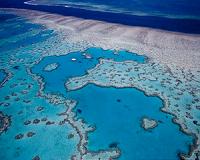 |
Ulan Bator (AFP) Feb 6, 2011 As her seven children scamper in and out of the small door of their traditional felt hut in Mongolia's capital Ulan Bator, Narantuya sits over the stove, pouring blocks of black coal onto the fire. In a city where average winter temperatures hover at a punishing minus 20 degrees Celsius (minus 4 Fahrenheit), the stove is the only source of heat for the 39-year-old unemployed single mother and her children. The family burns through two bags of coal and half a bag of wood each day to stay warm. But Narantuya says she still does not understand why the capital is blanketed in thick smog -- and how she is part of the problem. "I don't know why it happens but I know it affects my children. In winter, they are constantly sick with colds and coughs. I'm always afraid one of them will get a serious illness," the diminutive woman tells AFP. Despite its population of just one million people, Ulan Bator is one of the world's most polluted cities, sparking mounting concern about spiralling health care costs -- and tough criticism of a government scrambling to respond. Last month, Mongolian President Tsakhia Elbegdorj admitted the situation had reached "disaster" status. The World Bank says pollution levels are among the highest in any urban area worldwide. Research by the National University of Mongolia carried out in areas of the city where people live in felt huts -- gers -- shows pollution massively exceeds Mongolian air quality standards and World Health Organization guidelines. Late last year, the government enacted legislation that would force heavy polluters such as power plants, coal mines and even car drivers to pay fines, but the modalities of the law are unclear and loopholes remain. Munkhbat Tsendeekhuu, who works in the environment ministry's air pollution department, said the government hoped to raise 30 billion tugrik ($24.2 million) in 2011 alone -- money to be reinvested in clean energy technologies. But analysts say the plan is misguided and does not address the real problem -- how to phase out the inefficient stoves used by the city's tens of thousands of poor families, which are churning out thick black smoke 24 hours a day. "Ninety percent of our urban air pollution is from the ger stoves and less than 10 percent from cars and power plants," Lodoysamba Sereeter, an expert on urban air pollution at the National University of Mongolia, told AFP. "The government spent seven billion tugrik between 2007 and 2009 to produce briquettes and pressed coal. Unfortunately they don't reduce the smog because the ger stoves aren't designed to use them," he said. The tens of thousands of families living in Ulan Bator's ger districts -- a number that increases regularly as rural poverty drives people into the city -- have no access to the central heating grid that warms high-cost flats downtown. Narantuya spends 2,500 tugrik a day to heat her felt home, explaining: "Coal keeps the fire going longer, so it's cheaper and better to use." International organisations such as the Asian Development Bank and Germany's development agency GTZ are working with local bodies and researchers to design energy-efficient ger stoves and make them widely available -- not an easy task. "Ger area families are very poor. To change the ger stoves, they need money," Lodoysamba said. "But money is not the problem. The international organisations are willing to invest but when the government gets the money, it goes the wrong way." While acknowledging that the new legislation is ambitious, Munkhbat insists it will help, noting that part of the funds collected will be reinvested in ger areas. Onno van den Heuvel, a programme officer for biodiversity conservation at the UN Development Programme, warns the full impact of the pollution may not be known for decades. "The main problems are still to come. In the long term, we will see the impacts, but now people don't seem convinced it's a danger," Van Den Heuvel told AFP, noting that barely anyone in Mongolia wears protective face masks. The ADB estimates that health costs linked to pollution-related illnesses already account for as much as four percent of Mongolia's GDP -- an expense the country, one of the poorest in Asia, cannot afford. Narantuya says she believes the best way to protect her children from the smog is to keep them close to home. "Fortunately they don't have any serious health problems yet," she said.
Share This Article With Planet Earth
Related Links The Air We Breathe at TerraDaily.com
 Speeding Up Mother Nature's Very Own CO2 Mitigation Process
Speeding Up Mother Nature's Very Own CO2 Mitigation ProcessLivermore CA (SPX) Jan 21, 2011 Using seawater and calcium to remove carbon dioxide (CO2) in a natural gas power plant's flue stream, and then pumping the resulting calcium bicarbonate in the sea, could be beneficial to the oceans' marine life. Greg Rau, a senior scientist with the Institute of Marine Sciences at UC Santa Cruz and who also works in the Carbon Management Program at Lawrence Livermore National Laboratory, ... read more |
|
| The content herein, unless otherwise known to be public domain, are Copyright 1995-2010 - SpaceDaily. AFP and UPI Wire Stories are copyright Agence France-Presse and United Press International. ESA Portal Reports are copyright European Space Agency. All NASA sourced material is public domain. Additional copyrights may apply in whole or part to other bona fide parties. Advertising does not imply endorsement,agreement or approval of any opinions, statements or information provided by SpaceDaily on any Web page published or hosted by SpaceDaily. Privacy Statement |